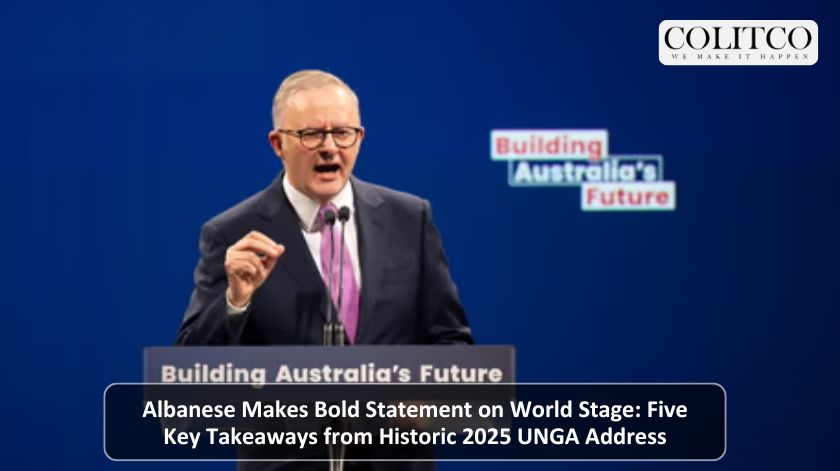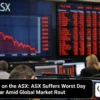Prime Minister Anthony Albanese stepped onto the global stage for his first-ever address to the UN General Assembly, delivering a speech that positioned Australia as a confident middle power willing to challenge major allies and chart its own course on critical international issues.
The address came just days after Albanese’s decisive re-election victory, giving him a strong mandate to pursue ambitious foreign policy goals despite recent domestic tensions, including farmers chasing his motorcade through Ballarat streets.
Palestine Recognition Dominates Opening
Albanese used his UN platform to defend Australia’s controversial recognition of Palestinian statehood, announced just five days earlier alongside the UK, Canada, and France. The coordinated move by three Five Eyes nations marked a significant shift in Western policy toward the Middle East conflict.
Australia will always do our part to shape a better future. 🇦🇺
That’s the message I shared with the United Nations General Assembly. pic.twitter.com/sM7dF9nS8x
— Anthony Albanese (@AlboMP) September 25, 2025
Speaking at the Two-State Solution Conference, Albanese drew parallels between Palestinian aspirations and historical Jewish hopes for homeland. “In recognising Palestine, Australia recognises the legitimate and long-held aspirations of the Palestinian people. It means real hope for a place they can call home. This is the same hope that sustained generations of Jewish people,” he declared.
The decision sparked fierce criticism from Israel and US Republicans, while Australia’s Opposition refused to support the recognition. Albanese defended the timing, arguing that unlike previous approaches waiting for peace process completion, “the world is saying, enough is enough.”
Climate Challenge to Trump’s “Green Energy Scam”
Just one day after Donald Trump spent nearly an hour at the UN calling climate change “the greatest con job ever perpetrated on the world,” Albanese mounted a vigorous defence of renewable energy transition.
The timing wasn’t coincidental. Albanese reaffirmed Australia’s commitment to reducing emissions by 62-70% by 2035, declaring: “Clean energy can carry the world beyond the false choice between economic growth and environmental responsibility.”
Climate change is not a challenge we can tackle alone.
Australia is doing our part – protecting our environment, creating jobs and powering our economy with clean energy.
Working with our global partners at the Climate Summit 2025, we’re driving the clean energy transition and… pic.twitter.com/Lp5xNCsgQC
— Anthony Albanese (@AlboMP) September 24, 2025
Hours after Trump’s climate scepticism dominated headlines, Albanese championed green energy, berating those who claim a “false choice” between environmentalism and the economy. The contrast highlighted growing divergence between traditional allies on environmental policy.
Australia’s position becomes more significant given recent trade tensions, with Trump refusing Australian exemptions from steel and aluminium tariffs earlier this year.
Security Council Ambitions Revealed
Albanese formally announced Australia’s bid for a non-permanent UN Security Council seat for 2029-2030, reviving a campaign originally launched by the Turnbull government in 2015. Elections will take place in June 2028.
“The United Nations is much more than an arena for the great powers to veto each other’s ambitions,” Albanese declared. “This is a platform for middle powers and small nations to voice – and achieve – our aspirations. That is why Australia is seeking a place on the UN Security Council in 2029-30.”
Australia previously held Security Council seats in 1946-47, 1956-57, 1973-74, 1985-86, and most recently 2013-2014. The 15-year gap between terms aligns with strategic timing recommendations from foreign affairs experts.
The campaign faces competition primarily from Finland, with diplomatic sources suggesting the race remains relatively uncontested compared to Australia’s previous contested bid.
Iran Expulsion Sends Strong Message
In a significant diplomatic escalation, Albanese announced Australia had expelled Iran’s ambassador – the first such action since World War II. The decision followed security agency findings that Iran directed antisemitic attacks on Australian soil, including the firebombing of Melbourne’s Adass Israel synagogue.
“We expelled the Iranian ambassador from Australia,” Albanese told the Assembly. “And here at the United Nations, we repeat to the world, there is no place for antisemitism.”
The expulsion represents Australia’s strongest response to foreign interference allegations, demonstrating willingness to take firm action against state-sponsored terrorism despite potential diplomatic costs.
UN Reform and Multilateralism Defence
While Trump questioned the UN’s value and effectiveness, Albanese defended multilateral institutions while acknowledging reform needs. He warned that resignation to inevitability of conflict would result in the UN “being trusted with nothing.”
“If we resign ourselves to the idea that war is inevitable, or relegate ourselves to the status of disinterested bystanders,” he warned. “If our only response to every crisis is to insist that there is nothing we can do, then we risk being trusted with nothing.”
The speech positioned Australia as a constructive middle power willing to work within existing institutions while pushing for meaningful reforms. This approach contrasts sharply with Trump’s confrontational stance toward international organisations.
Strategic Implications for Australia
Albanese’s UN debut signals several strategic shifts in Australian foreign policy:
- Independent Decision-Making: The Palestine recognition and climate commitments demonstrate willingness to diverge from traditional allies when national interests dictate different approaches.
- Middle Power Activism: The Security Council bid and multilateral engagement reflect confidence in Australia’s ability to shape global outcomes through institutional participation.
- Regional Leadership: Emphasis on Indo-Pacific security and ASEAN engagement positions Australia as a key regional player bridging Western and Asian interests.
The speech came amid complex international dynamics, with Australia already taking strong stances on Middle Eastern conflicts alongside European allies.
Also Read: Finally Set: Trump and Albanese Meeting Breaks 10-Month Diplomatic Drought
Looking Ahead
Albanese concluded by quoting the UN Charter Australia helped draft 80 years ago: “We are determined, ‘to save succeeding generations from the scourge of war’… ‘and live together in peace with one another as good neighbours’.”
The address establishes Albanese as a leader willing to pursue principled positions on contentious global issues, even when facing domestic criticism or ally disagreement. Whether this approach enhances or complicates Australia’s international relationships will become clearer as conflicts in Gaza and Ukraine continue evolving.
The UN speech marks a definitive moment in Albanese’s leadership, showcasing Australia’s vision for engaging with an increasingly multipolar world where middle powers must navigate competing great power interests while maintaining independent foreign policy positions.
FAQs:
Q: Why did Australia recognise Palestinian statehood now?
A: Albanese explained that coordinated recognition with allies aims to break the cycle of violence that has persisted for 80 years, rather than waiting for peace process completion.
Q: When will Australia’s UN Security Council campaign begin?
A: The campaign is already underway, with elections scheduled for June 2028 and the term running 2029-2030.
Q: How significant is the Iran ambassador expulsion?
A: It’s the first such expulsion since World War Two, representing Australia’s strongest response to alleged foreign interference and state-sponsored terrorism.












